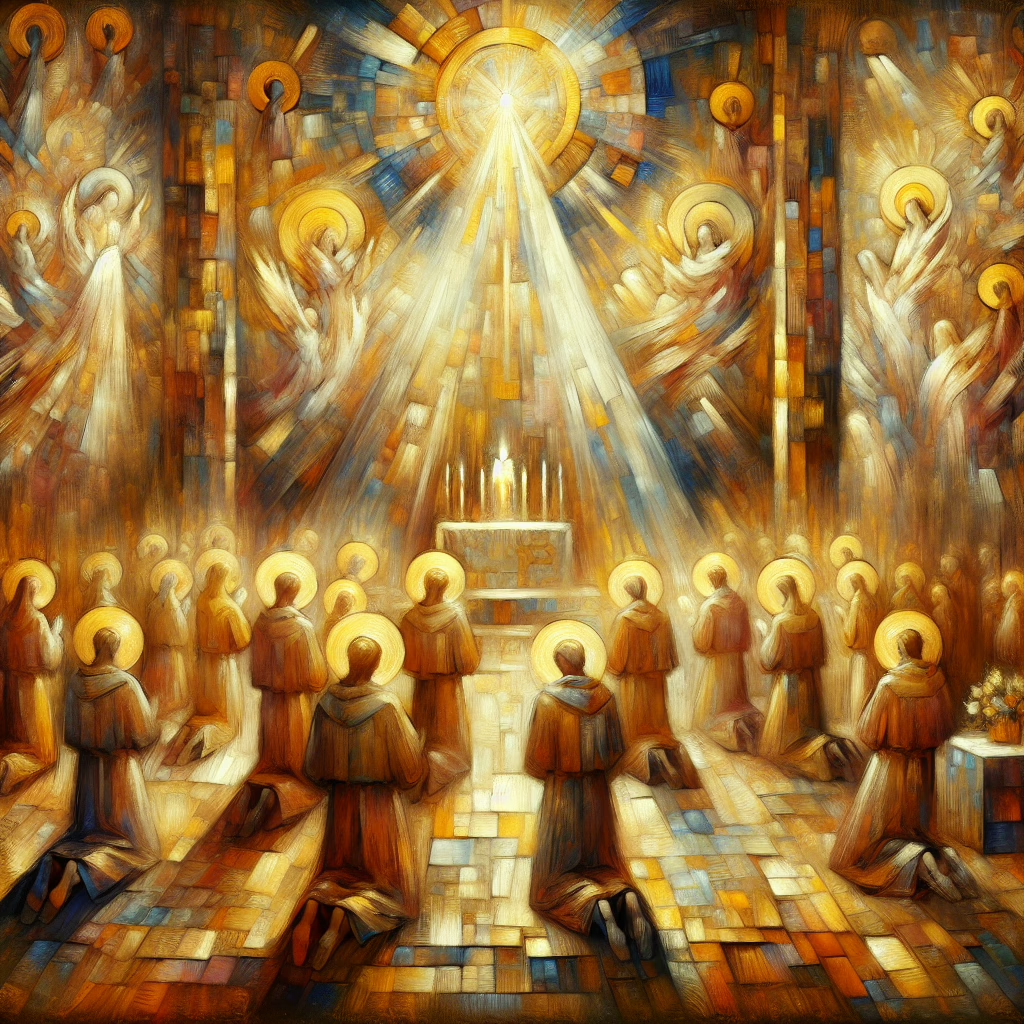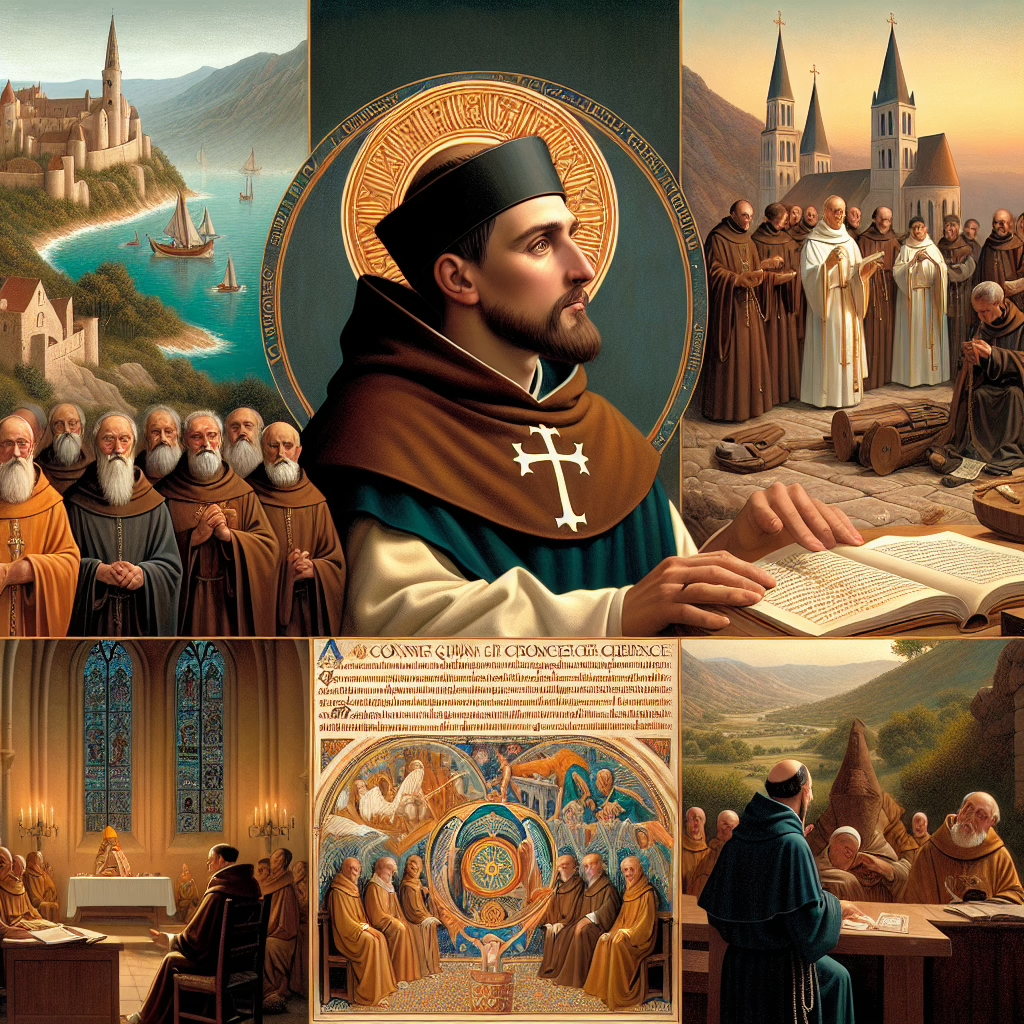St. Berthold: The Founding Father of the Carmelite Order
Introduction: The Life of St. Berthold
"In the crucible of strife and conflict, St. Berthold discovered the peace and power of prayer." It's moments like these that define the spiritual legacy of great saints. During the Siege of Antioch, St. Berthold, a simple priest, became a beacon of hope through his unwavering dedication to prayer and penance, setting an example that resonates through Catholic history.
St. Berthold is heralded as one of the founding figures of the Carmelite Order. Born in Limoges, France, and educated at the University of Paris, he is remembered for his significant contributions to Catholic monasticism during a tumultuous period. Through his leadership and unwavering faith, Berthold not only influenced the establishment of the Carmelite Order but also left a lasting legacy ingrained in the Church's traditions. In this blog, we will explore the life, teachings, contributions, and enduring legacy of St. Berthold.
1. Early Life and Education
1.1 Birth and Background
St. Berthold's story begins in the fertile lands of Limoges, France. In this vibrant medieval setting, he was born into a family of deep faith and spiritual conviction. His family's pious background played a crucial role in shaping his early worldview and nurtured his calling to a devout life.
More than just familial ties, it was Berthold's relationship with his relative Aymeric, the Latin Patriarch of Antioch, that profoundly influenced his spiritual journey. This connection would later become a pivotal aspect of his life as he joined Aymeric on the Crusades, carving out his place in religious history.
1.2 Education at the University of Paris
The University of Paris was a beacon of learning and spiritual enlightenment during Berthold's time and provided a fertile ground for nurturing his faith and intellectual acumen. Here, Berthold delved into theology and philosophy, expanding his understanding of the divine and deepening his commitment to his religious vocation.
As a student of one of the most prestigious institutions of the medieval world, his education was instrumental in cementing his theological foundations, empowering him to serve with wisdom and excellence.
2. Role in the Crusades
2.1 Journey to Antioch
Berthold's journey from the classrooms of Paris to the battlefields of the Crusades alongside Aymeric marked a transformative phase in his life. The Crusades were driven by a mix of military ambition and religious zeal, and Antioch was a focal point in this historical tapestry. Berthold's presence in this conflict was deeply marked by his faith, and he emerged as a spiritual guide amid the chaos of warfare.
The Siege of Antioch, a dramatic chapter in the Crusades, tested the resilience and faith of the Christian forces. Yet Berthold's persistent faith led him to seek divine assistance through prayer and penance.
2.2 Deliverance Through Prayer
Miraculously, through the communal prayers led by Berthold, the city of Antioch was delivered from the Saracen siege. This event became a cornerstone of Berthold's spiritual legacy, demonstrating the tangible impact of faith during tribulation. His story exemplifies the Christian belief in the "power of prayer"—a central theme in his teachings.
3. Founding of the Carmelite Community
3.1 Establishment on Mount Carmel
In 1185, Berthold turned his divine calling towards establishing a monastic community on Mount Carmel. This location, historically significant and imbued with the spiritual aura of the prophet Elijah, was no mere coincidence. Mount Carmel symbolized a sacred space for divine encounters and strength in solitude, and Berthold was determined to root his religious community there.
The choice of Mount Carmel was strategic and symbolic, representing a place where heaven touched earth, a haven for those seeking deeper communion with God.
3.2 Building the Monastery and Church
Under Berthold's guidance, the Carmelite community constructed a monastery and church devoted to the prophet Elias. This was not merely brick and mortar but a reflection of Berthold's vision—a sanctuary of contemplation and service. Governing this community for forty-five years, Berthold emphasized leadership through humility and spiritual ardor, nurturing a climate where monastic principles of prayer, community, and solitude could thrive.
4. Teachings and Lessons from St. Berthold
4.1 The Importance of Community
Community was a central pillar of Berthold's teachings. By uniting hermits and establishing a structured monastic life, Berthold demonstrated the power of collective faith. Today, his insights reverberate in the Catholic understanding of community as a vessel for spiritual growth, reminding us that the journey towards holiness flourishes within a supportive spiritual family.
4.2 Emphasis on Prayer and Penance
Berthold's enduring legacy in the Carmelite tradition is his unwavering commitment to prayer and penance. As Pope Benedict XVI remarked, "Prayer can change the world." Berthold's life is a testament to this belief, where ceaseless supplication manifested in miraculous interventions and guided the lives of countless converts. His teachings revealed prayer as an inexhaustible reservoir of spiritual strength, necessary in addressing modern-day challenges.
5. Miracles and Legends Associated with St. Berthold
5.1 Accounts of Miraculous Events
St. Berthold's life is studded with accounts of miraculous events, most notably the deliverance of Antioch. These stories serve to amplify his saintly reputation, suggesting the divine favor that accompanied his intercessions. Such miracles underscore the transformative impact faith can have on the lives of the faithful, reinforcing the belief that God actively works through His chosen servants.
5.2 Vision of Christ and its Symbolism
Beyond tangible miracles, Berthold was gifted with spiritual visions, including a purported vision of Christ admonishing the soldiers' ways during the Crusades. This vision encapsulates the moral and spiritual awakening Berthold promoted, calling believers to choose repentance and holiness over vice and discord.
6. Modern Relevance and Devotion to St. Berthold
6.1 Continued Influence of the Carmelite Order
The inspirational legacy of St. Berthold permeates modern Carmelite practices, which uphold the principles of contemplative prayer, community living, and Marian devotion that Berthold championed. These ascetic values contribute significantly to the spiritual tapestry of the Catholic faith, maintaining St. Berthold's ongoing relevance. Contemporary devotion to St. Berthold echoes in spiritual practices and pilgrimages, drawing strength from his enduring example.
6.2 Spiritual Practices Inspired by St. Berthold
Drawing from St. Berthold's life, Catholics today are encouraged to embrace practices that align them with his spiritual ethos. Prayers seeking his guidance and intercession form part of these devotions:
"Dear St. Berthold, intercede for us as we strive to cultivate unity in our communities and deepen our prayer lives. May your legacy inspire us towards greater devotion and contemplation. Amen."
Countless initiates find solace in these prayers, which align them with the enduring Carmelite spirituality.
Conclusion: The Lasting Legacy of St. Berthold
Throughout his life, St. Berthold exemplified a steadfast commitment to the ideals of faith, prayer, and community that have forever marked the Carmelite Order. He viewed communal living as the fertile ground for spiritual growth and saw prayer as the heart of a vibrant faith life. His unwavering dedication continues to inspire a spiritual renaissance within the Church.
St. Berthold's legacy calls us to cultivate our own spiritual journey, reminding us of the transformative power of faith. We invite you to delve deeper into the life and teachings of St. Berthold, seeking his intercession as you pave your path toward divine grace.





